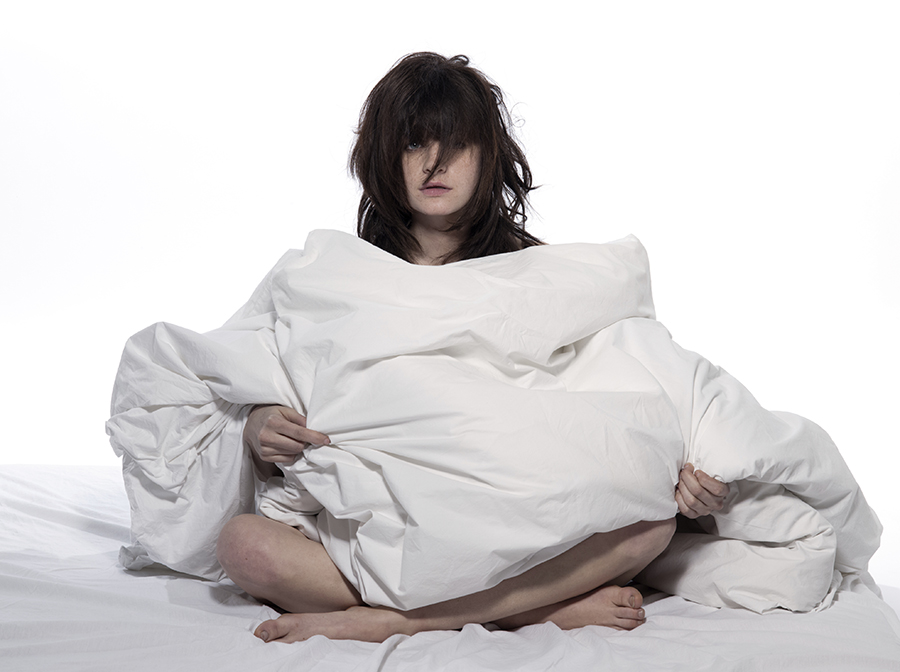Bad Sleep Habits Hurt Women with Bipolar Disorder

(This content is being used for illustrative purposes only; any person depicted in the content is a model)
Sleep is awesome. Let’s just say that right away. A good nap goes a long way under any circumstance in my book.
We of course know there are health risks associated with sleep deprivation and insomnia for people in general, and catching some Z’s is a good way to keep recharged and on top of your game, especially when you start to feel a little emotionally and/or mentally drained.
So it should not really be too much of a shock to the system to learn that poor sleep is being connected to negative mood shifts for women with bipolar disorder.
Bipolar Disorder
Bipolar disorder, also commonly known as Manic Depressive Disorder, is a brain disorder frequently characterized by:
- Severe mood swings
- Shifts in energy
- Drastic changes in activity levels
- Impaired ability to carry out day-to-day tasks
The condition is marked by extreme mood episodes characterized as Mania (highs), Depression (lows), Hypomania … or even a random mix of both emotional peaks.
Symptoms of Mania
- Moments of tremendous optimism and significant pessimism
- Rapid talking
- Little sleep
- Impaired judgment
- Irrational behavior
- Delusional behavior
- Hallucinations
Symptoms of Hypomania
- Higher than usual levels of happiness, irritability or energy
- A feeling that you’re capable of taking on more responsibility
- Feeling like you need less sleep
- You seem more talkative or sociable to others
- You are prone to engage in risk-taking behaviors, like substance abuse
Symptoms of Depression
- Feelings of hopelessness
- Loss of interest in things that used to make you happy
- Fatigue
- Changes in appetite – eating more or eating less
- Self-loathing
- Suicidal thoughts
With mixed episodes an individual tends to experience both mania and depression in tandem, and jumps from one extreme to the other interchangeably.
Sleeping On It
Sleeping issues are nothing new to most people with bipolar disorder, with poor quality of sleep and bipolar disorder seeming to only magnify one another in a co-existing loop of bad moods and restlessness. According to some experts patients with bipolar disorder often suffer with sleep problems even when many of their other symptoms are under control.
Researchers at Penn State College of Medicine and University of Michigan Medical School decided in order to find the best treatment for people suffering from sleep disorders who also had bipolar disorder meant they needed to investigate the differences between men and women with the condition.
Women and men sleep differently according to Dr. Erika Saunders, who is chair from the department of psychiatry at Penn State College of Medicine. She stated:
“We know from studies of the general population that women have a different type of sleep architecture than men, and they’re at different risks for sleep disorders, particularly during the reproductive years.”
Saunders also noted that men and women experience bipolar disorder differently, with women having more persistent and depressive symptoms along with other coexisting conditions such as:
- Anxiety
- Eating Disorders
- Migraine Headaches
Study on Sleepers
For this research the scientists analyzed data from 216 participants in the Prechter Longitudinal Study of Bipolar Disorder at the University of Michigan Medical School, focusing on mood outcome and the effect of sleep quality at the beginning of the study as it progressed over the next two years. Mood outcome was measured by the severity, frequency and variability (meaning how much symptoms went up and down) of depressive or manic symptoms.
For Women, poor sleep quality predicted increased:
- Severity and frequency of depression
- Severity and variability of mania
With the conclusion they came to many wanted to ask why women with bipolar were more drastically effected by poor sleep than men, and some suspect it is a biological mechanism. Saunders speculates based on animal models that reproductive hormones affect the circadian rhythm system, which impacts our sleep patterns.
More studies are set to examine this connection, but all this data has already given us a huge hint that the quality of sleep is essential when treating bipolar disorder, and could be even more serious when treating women with bipolar disorder.
Mental health and substance abuse tend to go hand in hand with other health concerns like sleep deprivation. Knowing the risks associated with harmful behaviors or just plain bad habits is important in order to recover from a debilitating disorder, and there are coping strategies you can learn to maintain a healthier and happier life. If you or someone you love is struggling with substance abuse or addiction, please call toll-free 1-800-777-9588
